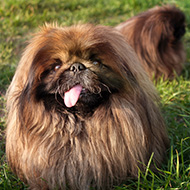Participants sought for BOAS study

The group is investigating the extent different dog breeds may be affected by breathing problems.
Dog owners are beings sought for a study to identify the risk of respiratory disease in different brachycephalic breeds and improve the health and welfare of future generations.
The project is being led by the Brachycephalic Obstructive Airway Syndrome (BOAS) Research Group at the University of Cambridge and follows 10 years of investigation by the team into brachycephalic health, funded by the Kennel Club.
Specifically, the Group is seeking owners of Affenpinschers, Boston Terriers, Boxers, Cavalier King Charles Spaniels, Chihuahuas, Dogue de Bordeaux, Griffon Bruxellois, Japanese Chins, King Charles Spaniels, Maltese, Pekingese, Pomeranians and Shih Tzus to investigate the extent different breeds may be affected by breathing problems, and to identify any risk factors involved.
Dogs must be aged 12 months and over, and will each be given a clinical exam - during which the researchers will take conformational measurements, DNA swabs for future genetic studies and perform breathing assessments. The dogs will also undergo a rapid, non-invasive tolerance to assess respiratory function – an element of the existing Kennel Club/University of Cambridge Respiratory Function Grading (RFG) scheme currently available for the bulldog, French bulldog and pug.
Data garnered in the study will be used by the team to develop respiratory function grading for more breeds if and as required.
“Brachycephalic dogs are very popular pets, so it’s crucial that we better understand the complex and wide-ranging factors that lead to some of these dogs being affected by BOAS or other health issues,” explained Dr Jane Ladlow, European and Royal College Specialist in Small Animal Surgery and BOAS researcher leading the project.
“Those owners who participate will play their part in helping us to understand more about the relationship between respiratory issues and neurological problems, and how these issues relate to the structure of affected dogs.”
In addition to this study, the BOAS Research Group is also seeking participants for an investigation into the internal anatomy of different brachycephalic breeds. Dogs for this study must be at least four years old, require dental treatment, and should not have previously had airway surgery.
Those interested in participating in either study are invited to contact the researchers directly via Brachy Study (University of Cambridge).



 The latest
The latest